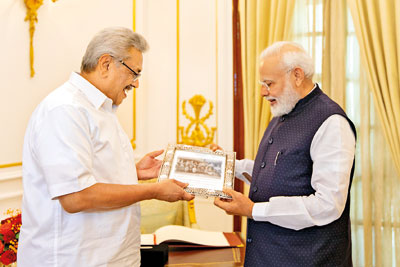News
Modi wants Lanka to fully implement 13th Amendment
Indian Prime Minister Narendra Modi once again called upon Sri Lanka to fully implement the 13th Amendment to the Constitution. This came during President Gotabaya Rajapaksa’s first official overseas visit since being elected.
India also offered Sri Lanka a US$ 400m line of credit for infrastructure and development and a further US$ 50m to combat terrorism.

India’s Prime Minister Narendra Modi presenting a framed photograph to Sri Lanka’s President Gotabaya Rajapaksa. The picture was taken while Mr. Rajapaksa followed his higher education at a military school in India
“President Rajapaksa told me about his inclusive political outlook on ethnic harmony,” Prime Minister Modi said while addressing the media jointly with President Rajapaksa after closed-door bilateral talks which only an Indian translator was privy to.
There was no Sri Lankan note-taker. “I am confident that the Government of Sri Lanka will carry forward the process of reconciliation, to fulfil the aspirations of the Tamils for equality, justice, peace and respect. It also includes the implementation of the 13th amendment,” Premier Modi said.
He said India wouldbecome a trusted partner for development throughout Sri Lanka, including the North and East.
President Rajapaksa’s two-day State visit signals his administration’s emphasis on maintaining strong relations with the neighboring nation which, in the past, had expressed concerns regarding Sri Lanka’s China-heavy diplomatic policy. He held talks with Indian President Ram Nath Kovind and also met w India’s External Affairs Minister Subrahmanyam Jaishankar.
At a ceremonial reception at Rashtrapathi Bhavan on Thursday, President Rajapaksa, who adopted a casual shirt-and-trousers dress code throughout the trip, said he wished to raise the relationship between India and Sri Lanka to a “very high level” during his tenure.
The following day, the President described his talks with Premier Modi were “extremely cordial and reassuring” and that matters related to the security of the two nations received priority. “India has always assisted Sri Lanka to enhance our capabilities in intelligence and counter-terrorism,” he told the media. “We look forward to continued support in this regard.”
Sri Lanka has had to rethink its national security strategies in the wake of the Easter Sunday terror attacks, President Rajapaksa said. He said assistance from India in this regard would be most appreciated. Sri Lanka would continue to work with India to ensure the Indian Ocean “remains a zone of peace”.
The two leaders discussed how India and Sri Lanka could cooperate economically as India was stronger on that front.
On the longstanding fisheries issue, the matter was spoken about at length, Mr Rajapaksa said, adding that Sri Lanka would release all boats belonging to Indian fishermen.
Prime Minister Modi told journalists India considered it an honour that President Rajapaksa chose India for his first foreign visit.
“It symbolises the strength and dynamism of friendly relations between India and Sri Lanka,” he said. “It is also a sign of how much importance both countries attach to these relations. We look forward to working closely with President Rajapaksa for the progress of both countries, and peace, prosperity and security in our entire common region.”
In line with his Government’s “Neighbourhood First” policy and SAGAR doctrine, India prioritised relations with Sri Lanka. “The security and development of our two countries are inseparable,” he said. “Therefore, it is natural that we should be aware of each other’s safety and sensibilities.”
The Prime Minister expressed delight that 46,000 houses were built for the internally displaced in the North and East under the Indian Housing Project. Good progress was also made in erecting 14,000 houses for Tamils of Indian origin in the up-country region.
He said he was pleased they agreed to use a previously-announced US$ 100mn credit line for solar projects in Sri Lanka early. There was a wide-ranging discussion between them about 20 community development projects and other people-centric projects initiated by India in Sri Lanka on the basis of grants in education and infrastructure.
India has always opposed terrorism in all its forms and also expected action from the international community against other forms of terrorism, including cross-border terrorism, Prime Minister Modi said. The Easter bombings were “brutal attacks on the diversity of mankind and the valuable heritage of symbiosis, he said.
“I went to Sri Lanka immediately after the elections in India to express India’s unwavering support in the Sri Lankan fight against terrorist and extremist forces,” Mr Modi recounted. “I have discussed in detail with President Rajapaksa (the need) for mutual security and to further strengthen mutual cooperation against terrorism.”
Sri Lankan police officers in major Indian institutions are already receiving the benefit of counter-terrorist training, he said, before announcing the credit line to combat terrorism.
Mr Rajapaksa invited Prime Minister Modi to Sri Lanka as the first Head of a foreign Government to visit the country since his election.
President Kovind hosted a banquet for President Rajapaksa at Rashtrapathi Bhavan on Friday night. The longstanding friendship between the two countries would be a source of strength for the entire South Asian region going forward, Mr Kovind said. He had also expressed confidence regarding the implementation of President Rajapaksa’s manifesto.
President Rajapaksa responded that he hoped to further strengthen the historic economic, trade and social ties between the two countries.
The President met with staff at the Sri Lankan High Commission in New Delhi yesterday. He also held an official meeting with the ruling Bharatiya Janata Party (BJP) General Secretary Ram Madhav. He had a reunion with Indian Transport and Highways Minister V.K. Singh. The Minister, a retired general of the Indian Army, and Mr.Rajapaksa had trained together in India while the president was in the Sri Lanka Army.

